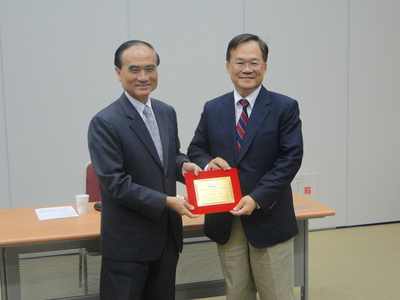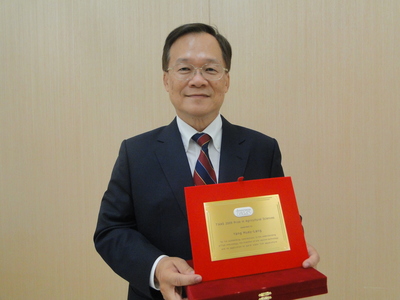NCKU Distinguished Prof. Huey-Lang Yang Received 2009 TWAS Prize in the Agricultural Sciences


Tainan, Taiwan, October 28th, 2010
Distinguished Prof. Huey-Lang Yang, the Director of Center of Bioscience and Biotechnology and Distinguished Professor at the Institute of Biotechnology at National Cheng Kung University (NCKU), Tainan, Taiwan, has won 2009 TWAS Prize in the Agricultural Sciences from The Academy of Sciences for the Developing World (TWAS), receiving a medal and an award of US$15,000 in the 21st General Meeting and a certificate from NCKU President Michael Ming-Chiao Lai in the staff meeting on October 28th.
Distinguished Prof. Huey-Lang Yang is recognized for his excellent achievements in aquiculture and awarded for his outstanding contributions to the understanding of fish immunology, invention of oral vaccine technology and application to warm water fish aquaculture.
Distinguished Prof. Huey-Lang Yang revealed, “Ten years ago, when I witnessed the disease of traditional aquaculture in Southern Taiwan, I have organized a research team, established a laboratory and created an experimental pond to conduct the biotechnological and medical research of grouper. Since then, the academic research, key technology research and development and product development of the young members of the team have resulted in achievements. Solving the bottlenecks of the development of the industry of the aquaculture of grouper and help assist National Cheng Kung University to become the center of international grouper biotech research and technological industry are currently our goals.”
Distinguished Prof. Yang has also showed appreciation for NCKU President Michael Ming-Chiao Lai, former NCKU President Cheng-I Weng, Senior Executive Vice-President Hwung-Hweng Hwung, as well as colleagues, graduate students, families and friends for their support.
Distinguished Prof. Huey-Lang Yang completed his bachelor degree at National Taiwan University, conducted his graduate studies at the University of California, Davis and received his doctoral degree in Bacteriology in 1972 which led him to pursue a career in microbiology.
Dr. Yang returned to Taiwan in 1989 to join the Development Center for Biotechnology (DCB). At DCB, he developed diagnostic kits for important diseases prevalent in the Asian population, such as human hepatitis C virus (HCV) and Epstein Bar virus for nasopharyngeal cancer. The development of the HCV diagnostic kit enabled general screening in blood banks in Taiwan, thereby drastically decreasing the transmission of this disease.
In recognition of this significant accomplishment, the Executive Yuan of Taiwan honored him with the Outstanding Contribution in Science and Technology Award in 1992. After successfully developing preventive diagnostic kits for several important infectious diseases for the Asian population, Dr. Yang decided to shift his focus to diseases impacting aquaculture in 1999. He commenced his research on warm water fish at National Cheng Kung University.
In less than ten years time, he created a team of five principal investigators and graduate students of over 40 researchers, and built a fish experimental station. Building upon his training and experience in basic research and product development, he has made rapid progress in fish immunology, inventing a novel oral vaccine delivery system, several fish vaccine products, and extended to the establishment of sustainable virus free indoor production system for grouper fingerling.
His contribution has led to the industrialization of grouper rearing and experimental station. Dr. Yang has established one of the best warm water fish research centers based upon ingenious research and innovation. His contribution in basic research and product development in warm water fish has been recognized both in Taiwan and by the international aquaculture community.
Additional Information:
TWAS, the academy of sciences for the developing world, is an autonomous international organization, founded in 1983 in Trieste, Italy, by a distinguished group of scientists from the South under the leadership of the late Nobel laureate Abdus Salam of Pakistan. It was officially launched by the secretary-general of the United Nations in 1985.
The Academy's strength resides in the quality and diversity of its membership, internationally renowned scientists elected by their peers. TWAS Fellows, who live and work in developing countries, represent 85 percent of the membership; TWAS Associate Fellows live and work in developed countries.
In 1991, the United Nations Educational, Scientific and Cultural Organization (UNESCO) assumed responsibility for administering TWAS funds and personnel on the basis of an agreement signed by TWAS and UNESCO. In 2004, the Italian government passed a law that ensures a continuous financial contribution to the Academy's operation. Representatives of the Italian government and UNESCO are members of the TWAS Steering Committee, which meets annually to discuss financial matters.
In addition to its strong links with UNESCO and ICTP, TWAS provides administrative support for the Organization of Women in Science for the Developing World (OWSDW, formerly TWOWS), the InterAcademy Panel (IAP) and the InterAcademy Medical Panel (IAMP). The Academy also maintains close ties with academies, research councils and ministries of science and technology in developing countries.
Distinguished Prof. Huey-Lang Yang, the Director of Center of Bioscience and Biotechnology and Distinguished Professor at the Institute of Biotechnology at National Cheng Kung University (NCKU), Tainan, Taiwan, has won 2009 TWAS Prize in the Agricultural Sciences from The Academy of Sciences for the Developing World (TWAS), receiving a medal and an award of US$15,000 in the 21st General Meeting and a certificate from NCKU President Michael Ming-Chiao Lai in the staff meeting on October 28th.
Distinguished Prof. Huey-Lang Yang is recognized for his excellent achievements in aquiculture and awarded for his outstanding contributions to the understanding of fish immunology, invention of oral vaccine technology and application to warm water fish aquaculture.
Distinguished Prof. Huey-Lang Yang revealed, “Ten years ago, when I witnessed the disease of traditional aquaculture in Southern Taiwan, I have organized a research team, established a laboratory and created an experimental pond to conduct the biotechnological and medical research of grouper. Since then, the academic research, key technology research and development and product development of the young members of the team have resulted in achievements. Solving the bottlenecks of the development of the industry of the aquaculture of grouper and help assist National Cheng Kung University to become the center of international grouper biotech research and technological industry are currently our goals.”
Distinguished Prof. Yang has also showed appreciation for NCKU President Michael Ming-Chiao Lai, former NCKU President Cheng-I Weng, Senior Executive Vice-President Hwung-Hweng Hwung, as well as colleagues, graduate students, families and friends for their support.
Distinguished Prof. Huey-Lang Yang completed his bachelor degree at National Taiwan University, conducted his graduate studies at the University of California, Davis and received his doctoral degree in Bacteriology in 1972 which led him to pursue a career in microbiology.
Dr. Yang returned to Taiwan in 1989 to join the Development Center for Biotechnology (DCB). At DCB, he developed diagnostic kits for important diseases prevalent in the Asian population, such as human hepatitis C virus (HCV) and Epstein Bar virus for nasopharyngeal cancer. The development of the HCV diagnostic kit enabled general screening in blood banks in Taiwan, thereby drastically decreasing the transmission of this disease.
In recognition of this significant accomplishment, the Executive Yuan of Taiwan honored him with the Outstanding Contribution in Science and Technology Award in 1992. After successfully developing preventive diagnostic kits for several important infectious diseases for the Asian population, Dr. Yang decided to shift his focus to diseases impacting aquaculture in 1999. He commenced his research on warm water fish at National Cheng Kung University.
In less than ten years time, he created a team of five principal investigators and graduate students of over 40 researchers, and built a fish experimental station. Building upon his training and experience in basic research and product development, he has made rapid progress in fish immunology, inventing a novel oral vaccine delivery system, several fish vaccine products, and extended to the establishment of sustainable virus free indoor production system for grouper fingerling.
His contribution has led to the industrialization of grouper rearing and experimental station. Dr. Yang has established one of the best warm water fish research centers based upon ingenious research and innovation. His contribution in basic research and product development in warm water fish has been recognized both in Taiwan and by the international aquaculture community.
Additional Information:
TWAS, the academy of sciences for the developing world, is an autonomous international organization, founded in 1983 in Trieste, Italy, by a distinguished group of scientists from the South under the leadership of the late Nobel laureate Abdus Salam of Pakistan. It was officially launched by the secretary-general of the United Nations in 1985.
The Academy's strength resides in the quality and diversity of its membership, internationally renowned scientists elected by their peers. TWAS Fellows, who live and work in developing countries, represent 85 percent of the membership; TWAS Associate Fellows live and work in developed countries.
In 1991, the United Nations Educational, Scientific and Cultural Organization (UNESCO) assumed responsibility for administering TWAS funds and personnel on the basis of an agreement signed by TWAS and UNESCO. In 2004, the Italian government passed a law that ensures a continuous financial contribution to the Academy's operation. Representatives of the Italian government and UNESCO are members of the TWAS Steering Committee, which meets annually to discuss financial matters.
In addition to its strong links with UNESCO and ICTP, TWAS provides administrative support for the Organization of Women in Science for the Developing World (OWSDW, formerly TWOWS), the InterAcademy Panel (IAP) and the InterAcademy Medical Panel (IAMP). The Academy also maintains close ties with academies, research councils and ministries of science and technology in developing countries.
Provider:
新聞中心
Date:
99-11-02



